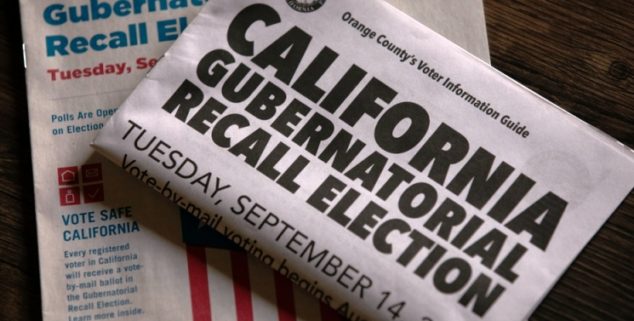News
Recall elections increasingly define political landscape
 A newspaper's election gives readers information about the Sept. 14, 2021, recall election. (Photo: Matt Gush, via Shutterstock)
A newspaper's election gives readers information about the Sept. 14, 2021, recall election. (Photo: Matt Gush, via Shutterstock)California’s attention was focused recently on the failed attempt to recall Gov. Newsom as a rare event of historical magnitude. In fact, recall elections happen all the time, and all but a relative handful of these obscure contests disappear into the limbo of history.
Newsom, a Democrat, captured support from better than six out of 10 voters across the state. But at the local level, robust recall efforts have developed.
Since 1913, the secretary of state reports, there have been 231 recall attempts against statewide officers and members of the Legislature.
There is irony here. State Sen. Marshall Black, a Republican representing the 28th District, authored the legislation that extended the recall to include local and city officials. He also was its first victim: In 1913, Black was accused of embezzlement for stealing $140,000 and was quickly recalled from office and sentenced to four years in prison.
Since then, the secretary of state reports, there have been 231 recall attempts against statewide officers and members of the Legislature — 55 against the governor, 50 against members of the Assembly and 30 against state senators.
Six recall campaigns, including Black’s, were successful — the 2003 ouster of Democrat Gray Davis, and the others against legislators, including the ouster in the 1990s of two lawmakers caught in a ferocious Assembly speakership battle. The most recent was the 2018 ouster if Josh Newman, a Democrat, who was recalled by voters outraged at a vote he cast on taxes.
There have been numerous recall attempts against local officials, but they get far less attention in the statewide media. Following is a sampling of the latest efforts, focusing on some of the more interesting, In some of them, the pandemic played a role.
On Sept. 18, just four days after the Newsom recall election, a small group gathered in Elk Grove south of Sacramento to push two separate recall campaigns against local politicians.
In the city of Vernon southeast of downtown L.A., two City Council members have already been recalled this year.
Organizers of the activist group claimed Elk Grove Mayor Singh-Allen made derogatory comments targeting the Hmong community.
The group also seeks to oust Nancy Charies Espinoza, who won a seat on the Elk Grove Unified School District school board just last year through a special election. The parent group, EGUSD Parent Coalition, claims that the trustee mistreated parents who attempted to participate in the school district’s school reopening process.
Meanwhile, in San Francisco, three school board members have also been targeted.
Gabriela López, Faauuga Moliga and Alison Collins will face a recall election on Feb. 15, stemming from parental frustration with the district’s lack of a plan to return students to campuses after low covid rates, while enrollment in the district plummeted as well. Incumbent state Sen. Scott Wiener has endorsed the recall, saying the school board is “in dire need of change.”
The recall efforts have not yet come to fruition.
But in the city of Vernon southeast of downtown L.A., two City Council members have already been recalled this year.
A recall effort against L.A. County District Attorney George Gascón fizzled after backers said they had not collected enough signatures to qualify it for the ballot.
This recall was the first in over 100 years for the tiny industrial city, which has 130 residents, is the smallest incorporated city in California and, amazingly, has a $300 million budget. Voters recalled City Council Members Diana Gonzales and Carol Menke on June 1. Media reports suggested that Gonzales and Menke violated the public trust by supporting a solar and wind project led by an allegedly corrupt developer.
A recall effort against L.A. County District Attorney George Gascón fizzled after backers said they had not collected enough signatures to qualify it for the ballot. In San Francisco, a recall effort against District Attorney Chesa Boudin may make the ballot, after an initial attempt failed earlier this year. Recall supporters reportedly turned in more than 80,000 signatures, about 30,000 more than the number required to make the ballot.
Also in Los Angeles, City Council members Mike Bonin and Nithya Raman both faced recalls. Raman, a first-term progressive who defeated an entrenched incumbent, also faced the prospect of her district being dramatically rewritten in the latest redistricting.
In Sonoma County, a recall effort made the Sept. 14 ballot against District Attorney Jill Ravitch, but voters rejected it.
Meanwhile in Redding, a member of the Shasta County Board of Supervisors, Leonard Moty, faces a recall election in February 2022. An earlier recall effort launched in April targeted two other supervisors as well, Mary Rickert and Joe Chimenti, but the campaign against them was scrapped, and only Moty remained.
It may seem like California is mired in recalls, but 2021 isn’t as bad as 2020. Lawmakers have already heard testimony to improve California’s recall process, but there has been no consensus on how to do it.
Joshua Spivack runs a blog targeting recalls and he watches them closely.
“There have been six recalls in California this year. Last year there were 61 attempts, but with only 8 of those succeeding. While this all might not sound like a lot, keep in mind in 2019 California had no recalls,” he said.
—
Editor’s Note: Uriel Espinoza-Pacheco is a Capitol Weekly Work-Study intern with The Met School in Sacramento.
Want to see more stories like this? Sign up for The Roundup, the free daily newsletter about California politics from the editors of Capitol Weekly. Stay up to date on the news you need to know.
Sign up below, then look for a confirmation email in your inbox.

Leave a Reply